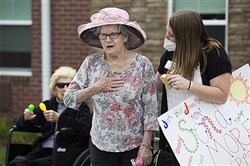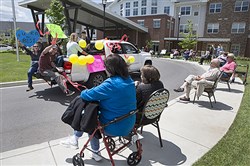VOL. 44 | NO. 20 | Friday, May 15, 2020
Working toward a new normal in senior living
By Hollie Deese
With COVID-19 rampaging through nursing homes and assisted living facilities the past two months, tens of thousands of Americans are reconsidering everything they knew about elder care and extended-family living arrangements.
How can they not?
The news is horrifying, and more so with every passing day: In New Jersey, every one of the state’s 400+ facilities has reported cases, while in Florida, Gov. Ron DeSantis tried for weeks not to disclose which facilities had been affected before ultimately releasing a list of more than 300. And last weekend, The New York Times reported that one-third of all coronavirus deaths are among long-term care residents and staff.
In Tennessee, there are 700 long-term care facilities caring for 70,000 Tennesseans. Through Tuesday, Tennessee’s COVID-19 Unified Command team has reported 815 positive cases and 87 nursing home deaths across the state. Twenty-three of those deaths were at a nursing home in Gallatin, by far the largest outbreak in the state.
The pandemic is revealing all the weaknesses and flaws in such places for those who thought they were ensuring extra safety or better medical care by placing ailing elderly relatives in a specialized residential facility, no matter how expensive the facility is.
And it begs the question, if you (or insurance) are paying tens of thousands of dollars or more for long-term care that ultimately leaves your loved elders at risk, would the money be better spent coming up with a plan to allow the senior to live with family for a longer period of time?
Or is this an opportunity for a change in the industry that will be better for everyone moving forward? The industry might face loss of occupancy, worker shortages and increased oversight from states and health care agencies.
‘Socialization’
Robin Barry and her husband, singer and songwriter John Barry, moved to Gallatin six years ago, and about two-and-a-half years ago moved her mother, Carol, from Georgia to the area.
Carol, 87, had been living independently but had been diagnosed with dementia and needed to be in assisted living. The Barrys moved her into one assisted living facility they loved, but after she took two bad falls in two days – breaking her arm and multiple bones in her face and around her eye – they knew the level of care had to be accelerated.
“After eight weeks of rehab, we knew we needed to get her in memory care,” Robin Barry says.
After visiting a few places, the couple chose Clarendale at Indian Lake in Hendersonville. For Barry, the facility just felt right.
“When I walked in there I knew that was the place for my mom,” Barry says. “It was just an overwhelming confirmation in my heart that this was where she needed to be. The feeling I had when I walked in, it felt like home. And then we visited with the memory care area and met the director, and it gave me such a peace of mind to know my mom was going to be surrounded by people who understood her and her dementia.”
Barry’s mom had always had a vibrant life, but that began to fade when she was home alone. Barry wanted to get that back for her, even in memory care.
“Over the years she has been a big walker and likes being active, but when she was in her home by herself her quality of life was not as good as where she is now. She is interacting with people. and that is giving her a sense of purpose. She is active and her mind is being engaged.”

A Clarendale at Indian Lake resident reacts to meeting her 1-month-old great-granddaughter for the first time.
-- Photo By Michelle Morrow |The LedgerClarendale at Indian Lake is a senior living community that opened in March 2018 and offers three lifestyle choices – independent living, assisted living and memory care – all under one roof in a residential part of town.
Such a community offers freedom from household chores, more privacy than a nursing home and help with everyday routines such as dressing or bathing as the resident becomes less mobile or ill.
One of the biggest pluses of senior living is independence, some residents being able to participate in the broader community by shopping or attending a place of worship, or having activities with neighbors in the facility.
“What people are looking for is socialization,” says Cheri Anderson, director of sales and marketing at Clarendale. “It is typically a person who is sitting home alone and they are looking for socialization, activities. Or, it is need based and they are looking for care in our assisted living and memory care.”
But the pandemic has robbed many of the socialization they crave since group activities at these facilities have been temporarily eliminated.
Anderson says her facility began taking steps in early March to make sure their residents and staff were protected from the coronavirus, including restricting outside visitors, requiring staff to wear masks all day after having their temperature taken at the front entrance every morning, constant hand-washing and social distancing. If a resident goes in the hospital or skilled rehab and returns, there is a mandatory 14-day quarantine.
Plus, all items dropped off for residents at the front door are wiped down before being delivered to the resident.
When Clarendale reopens in phases, it may require residents to wear masks, too.
But by far the hardest adjustment for residents and family is not being able to visit in person. So they have gotten creative with Facetime, visits through the window and even a parade, where Barry was able to see her mother for the first time in eight weeks.
Anderson says it is imperative that residents and family stay connected.
“That little short moment will lift their spirits for a while,” Anderson points out. “They are not alone. We are here with them, and we know it is not the same as their children, but we will do what it takes to make them feel better. We are probably now Skyping and Facetiming with their kids now more than we ever did before.”
No one has tested positive for COVID-19 at Clarendale, but officials have a plan in place if it does happen in any part of the facility, including isolation, sending in a staff member in full PPE gear to do daily temperature checks and quarantining them for 14 days with no fever.
“Thankfully, our residents are not as susceptible to getting sick as if they were in a nursing home, where residents might be bed-ridden, on ventilators or feeding tubes, which makes them more susceptible to COVID-19,” Anderson says. “We don’t have that in our facility. We just have an older community.”
Barry admits it did cross her mind about what to do if a case was detected at her mom’s facility, but after discussing it with her brothers they determined they would just cross that bridge if they came to it. “They have been very honest and up-front with what they are doing and how they are doing it.”
A shift in mindset

Residents of Clarendale at Indian Lake wave to family and friends during a social-distancing parade at the facility in Hendersonville.
-- Photo By Michelle Morrow |The LedgerBecci Bookner is the president of Family Staffing Solutions, a personal care company headquartered in Murfreesboro with other locations in Nashville and Shelbyville. The company specializes in providing personal care and in-home assisted living services for seniors in the privacy of peoples’ homes – an option that may be considered more and more by families and their aging relatives as people rethink communal long-term care facilities post-pandemic.
“We are receiving constant phone calls from adult children about whether we can still be there for their parents,” Bookner explains. “Families have concerns and fears. Many of our clients need or want to talk. They are alone. They are frightened. There is so much anxiety out there, particularly for those clients who live alone and really are not emotionally able to filter the 24/7 news and opinion shows.”
A mindset shift in how people care for their elderly relatives is certainly going to come into play, whether people feel safer with their loved ones at home, or safer with them in a facility where they can be cared for.
“I believe that everyone would like to stay in their own home, as long as they can. And yet there are some times when they do have to move to health care or assisted living,” Bookner adds.
“Obviously, if you had 24/7 with the personal care company, you were talking about a ton of money, but not everybody needs 24/7 care.”
During the quarantine, Family Staffing Solutions has been trying to provide more comfort and security to clients because, Bookner says, clients are absolutely mortified by what they are hearing on the news.
“They don’t know whether they’re listening to opinion or they’re hearing facts,” she says.
“They’re scared to death. We have one sweet lady who is 83 and was so independent. She went from going to the beauty shop, to church, to having her friends over, to isolation. Now the caregivers have to wear a mask and gloves, and it’s this reminder that something’s terribly wrong, and they don’t really know how to behave.”
Now she says people in long-term care positions have a great opportunity to try to make things better for residents who are paying the biggest price because they are the most vulnerable. And families just might consider keeping parents at home even just a bit longer than they might have before.
“The relationship between families and between adult children and their parents will have to be different based on the horror stories that we’ve seen with just not being able to be with your family when you need to be there, so much at the worst possible time, like when your wife passes away and nobody from your family can get in there,” she says.
“This has put a lot of things on the table that I think families will begin to consider. And even if it’s just for a little bit longer, they’re going to let mom stay at home.”
For Barry, who is used to going to the facility multiple time a week, sometimes with her husband, who performs, it has been a blessing to have the peace of mind having her mother cared for during the pandemic, and she says it’s really just a continuation of the care they have been providing her mom the whole time.
“When we go out on John’s Christmas tour, I don’t have to worry,” Barry says. “They let me stay in touch with her as best I can. It has been a blessing to have her in that community. I have just come to love so many of the residents there in memory care where my mom is. They just function like a family. And it is so beautiful.”
And for her mom, thankfully, life in memory care has not changed very much at all the past few months, other than not being able to have visitors.
“In memory care they are not around people coming in and out of there all the time, and they were still able to do activities and all the things my mom loves to do – listen to music and watch TV together, puzzles, arts and crafts,” Barry says. “Her life did not dramatically change because of COVID-19.”
In fact, they got a call from the staff that she and John could come back to see her for Mother’s Day – through the window.
They were able to stand at the window and “give lots of air hugs and blow kisses and say I love you.”